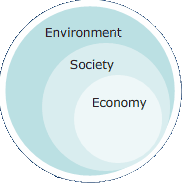|
Sustainability More and more people are using the term "sustainability" as part of conversations seeking to address the ecological, social and economic challenges we face today. However, many use the term carelessly and without awareness or understanding of the true interconnectedness of these challenges. For example, organic food production does not embody sustainability if it relies on global distribution systems and exploitation of farm workers. A major purpose of this project was to more deeply consider the meaning of the term sustainability. An articulation of its meaning from the perspectives of a sample of indigenous leaders from within Salmon Nation Sis one of the project's main contributions as part of the narrative summary: While the idea of sustainability is not new, the United Nation's (UN) World Commission for the Environment and Development (WCED) is credited with energizing the concept by defining sustainable development as "development that meets the needs of the present without compromising the ability of future generations to meet their own needs" (WCED, 1987, p. 13). Following the same line of thought, Hawken (1993) characterizes sustainability as an economic state where the demands placed upon the environment by people and commerce can be met without reducing the capacity of the environment to provide for future generations. Thoughtful definitions tend to speak to the necessity to create symbiotic, mutually supportive, aligned relationships among the domains of natural ecosystems, society and economy.
To learn more about the concept of sustainability we recommend the following links:
Read more: Dissertation_Hall_2008.pdf (see pp 8-16, and pp 62-69) |
